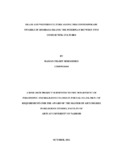| dc.description.abstract | From the timeless era to the present day, the relationship between the West and Islam has
been one of conflict and misunderstanding which have aroused animosities between the
two incompatible cultures. This is due to their contrasting world views. Yet the influence
of the West has continued to impact on the Swahilis of Mombasa Island affecting their
practicing of Islam. This has led to cultural conflict between the two opposing cultures.
This study is an examination of impacts of Western culture on the practice of Islam of
Mombasa Island and the reason that has made Western culture to be attractive in the lives
of the Swahili. The study will demonstrate impacts of intercultural relationship between
Islam and the West among Swahili people with specific reference to Mombasa Island..
Majority of the Swahili of Mombasa Island are Muslims who are supposed to adhere to
Islamic principles based on the Quran and Prophetic tradition that outlaws Western
practices. However, these practices still persist among the Swahili. In order to determine
the impact of Western culture on practicing of Islam among these people a survey was
done through interviews and participant observation. Both qualitative and quantitative
approaches were used, this study was carried out in Mombasa Island , Mombasa County
in Coast Province of Republic of Kenya. The researcher targeted and interviewed elderly
Swahili men and women, Swahili youth in Secondary schools and Colleges based in
Mombasa Island. in-depth interview and administering questionnaire were used to collect
data, Statistical Package of Social Science (SPSS) was used to compute the data statistics.
The findings of the study indicate that a substantial number of these people continue to
practice Western culture. This has affected their practicing of Islamic obligations to an
extend that one would rather watch a football match than attend mandatory prayers at the
mosque. It was found that some of the Swahili people have abandoned Islam for Western
culture due to their weak Islamic faith, ignorance of its dogmatic teachings, peer pressure
and pursuits of fun and pleasure offered by modernity aspects of the West. To this end it
is tragically concluded that Islam has not been able to completely deter the strong
tempting wave of Western culture sweeping across the Islamized Swahili of Mombasa
Island. | en_US |

